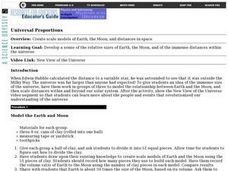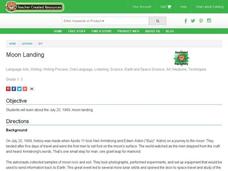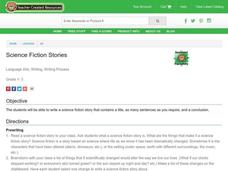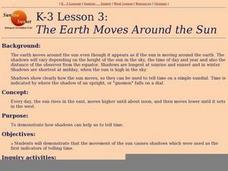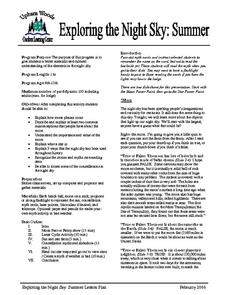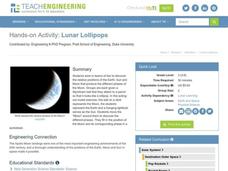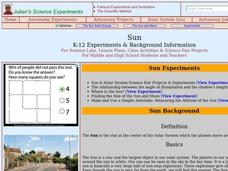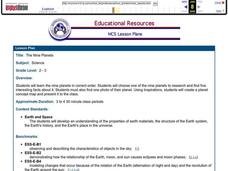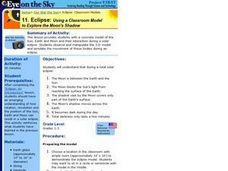Curated OER
Universal Proportions: Earth and Moon
Students create scale models of Earth, the Moon, and the distances within the universe. Working in groups, they construct their models of Earth and the Moon on a scale of 50:1 and calculate how far apart to place their models. They...
Curated OER
Your Weight on Other Planets
Students explore their weight on other planets. In this science lesson, students view a presentation about the other planets and complete a worksheet in which they make predictions about their weight on the moon and other planets.
Curated OER
Moon Landing
Students research about the July 20, 1969, moon landing. They demonstrate their knowledge of the first moon landing by creating peek-a-boo rocket books. Also they can make their own moon rocks with an easy-to-make dough.
Curated OER
Science Fiction Stories
Students review the story writing process and the elements such as prewriting, drafting, editing, revising, publishing, and assessment. Next students write a science fiction story that contains a title, the requested number of...
Curated OER
The Earth Moves Around the Sun
Students demonstrate that the movement of the sun causes shadows which were used as the first indicators of telling time.
Curated OER
Exploring the Night Sky: Summer
Learners explain how moon phases occur. They describe and explain at least two common misconceptions that people have about the moon. Students explain what a star is. They explain 3 ways that the night sky has been used throughout history.
Curated OER
Wobbling in Circles
Sixth graders role play the parts of the sun, the moon and the Earth as they simulate the concepts of revolution and rotation. They act out the parts in small groups and discuss the concepts as a class.
Curated OER
Lunar Lollipops
Students work with a partner, Styrofoam ball and light source to simulate the positions of the Earth, Moon and Sun at various stages during the phases of the Moon. They describe why the Moon is visible from Earth and complete a worksheet.
Curated OER
The Reasons for the Season
Students explain the reason for the changes in season. In this instructional activity examining the relationship between the Earth and the Sun, students use an applet to discover how the alignment of the Earth and the Sun cause the...
Curated OER
Sun
Learners study how the sun is at the center of the solar system. In this solar lesson students measure the altitude of the sun and its size.
Curated OER
Tides - The Ins and Outs of Tides
Get your junior oceanographers to generate tidal prediction graphs on an interactive website. They will feel like experts in the field, or shall we say, experts in the ocean! This is a brief, but worthwhile activity that could be used to...
Curated OER
The Nine Planets
A solid instructional activity on teaching the nine planets in our solar system is here for you. In it, young scientists learn the correct order of the planets, and they choose one of the planets to do a research report on. They must...
Journey Through the Universe
Our Solar System
Take your class on a journey through our solar system. Learners explore each planet, from Mercury to Pluto, and discuss various features that differentiate one from another. They complete activities related to the topics and discuss the...
Curated OER
Day and Night
Good Night, Moon is a classic little ones absolutely love. It's a sweet book that can be used, as in this lesson plan, to start a conversation about the difference between night and day. After reading the story, the class brainstorms...
NASA
Collecting Electromagnetic Radiation
Astronomy is literally over your head, but this lesson will explain how we study it. Young scientists make telescopes, calculate and compare the light gathering power of lenses, and simulate detection of infared radiation....
Glynn County School System
Light, History, Gravity, Distance, Relativity, and Space-Time
Let the star's color be the guide! The color of a star indicates its temperature and its mass and distance affect the gravitational force. The lesson presentations address these concepts as well as how the theory of special relativity...
American Museum of Natural History
What is Marine Biology?
A marine environment covers the majority of the earth but is arguably the least understood. Teach young scientists about the characteristics of oceans and ocean species using an interactive online lesson. The in-person or remote learning...
Teach Engineering
The Amazing Red Planet
Introduce your class to Mars with a resource that provides information about its size, location, length of day, length of year, number of moons, and average temperature. Also includes is information about the lans for past...
Curated OER
Recycling Quiz
Ten multiple questions about recycling comprise this quiz. Administer this as a pre-test prior to presenting a lesson on recycling glass, plastic, and metals. Since an answer key is provided along with comments, you can use it as a guide...
Curated OER
Seasons and Cloud Cover, Are They Related?
Students use NASA satellite data to see cloud cover over Africa. In this seasons lesson plan students access data and import it into Excel.
Curated OER
Eclipse: Using a Classroom Model to Explore the Moon's Shadow
Students manipulate and observe a 3-D model which simulates the activity of the Sun, Earth and Moon during a solar eclipse.
Curated OER
Planetary Surface Evolution and Resurfacing
Learners are provided with drawings of planet surfaces in order to investigate different types of planetary terrain. They make observations for each planet and discuss the characteristics observed. The lesson includes background...
Curated OER
Solar System Hall Model
Not novel, but fun, this lesson gets your space science learners to model the size of the planets and the solar system along your school's hallway. Scaled measurements as well as actual distances are provided for both planet diameters...
Curated OER
Newton's Universal Law of Gravitation with Simple Machines
First graders engage in a lesson plan that is about Newton's Laws Of Gravitation while conducting research in order to perform an information search. They sing a song about the Law of Gravitation and play a game of Ring Around The Rosie....


